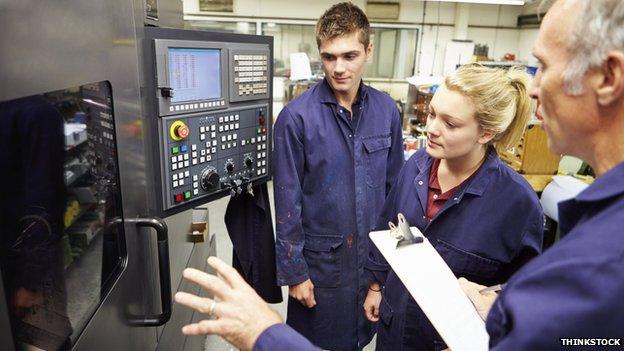Strategy to cut youth unemployment by 40%
- Published

A plan aimed at cutting youth unemployment in Scotland by 40% by 2021 has been unveiled by the Scottish government.
The new youth employment strategy will focus on forging closer links between schools, colleges and employers.
It comes in response to a report by Sir Ian Wood's Commission for Developing Scotland's Young Workforce.
The commission concluded that Scotland was not preparing or equipping its young people for work.
Ahead of the publication of the strategy, ministers also announced a further £6.5m for local authorities to help improve vocational education.
Sir Ian's report, published in June, made a total of 39 recommendations, including providing quality work experience, increasing recognition of colleges' role in developing the workforce and providing more modern apprenticeships.
The Scottish government said the recommendations had informed the strategy's aims to enable young people of all backgrounds to succeed in a stronger, fairer and more equitable society.
Key measures which will be put into place over the next seven years include:
Increased uptake of work-related learning and qualifications in the senior phase of school.
Earlier careers guidance available from 2015/16.
New standard for work experience by 2015/16.
New "pre-apprenticeship" pilot to help those furthest from the labour market by 2015/16.
All secondary schools to have active partnerships with employers by 2018/19.
Cabinet Secretary for Fair Work, Skills and Training Roseanna Cunningham and Minister for Youth and Women's Employment Annabelle Ewing announced the plans on a visit to Glasgow Kelvin College's Springburn campus.
Ms Cunningham said: "Scotland's economy is growing stronger and our employment figures are improving on a monthly basis.
"However, history shows us that it is younger women and men who find it most difficult to find a job, even when our economy is at its most resilient. Returning to pre-recession levels of youth employment is not enough and the Scottish government's commitment to supporting more young people towards high quality jobs remains unwavering.
"The youth employment strategy being published today outlines what we plan to do to equip our young people with the skills and knowledge they need from the early years right through to the senior phase and into an apprenticeship, further and higher education, and a job."
She added: "The milestones over the next seven years are very clear and as part of our economic growth, I expect to see youth unemployment reduced by 40% by 2021."

Analysis
Jamie McIvor, BBC Scotland education correspondent
There are all kinds of challenges and potential solutions here.
One is helping ensure young people get the best possible careers guidance and vocational education. That way youngsters are more likely to be doing courses they want to do and benefit from them.
Another is to help increase the number of modern apprenticeships available - often they provide a good alternative to university or a full time college course.
But another challenge concerns unemployment itself. Ultimately employers need to be willing to recruit and jobs need to be available.
Reducing youth unemployment substantially may well be just as much about economic policy as education. But the greater the young person's skills, the less likely they are to become an unemployment statistic.

Ms Ewing said: "The Commission's report highlighted a number of cultural issues which we all need to work together to address.
"As a society we will do better if we can benefit from the skills, talents and innovation of all our people, which is why we are committed to enabling everyone to participate fully in the workforce, especially groups that are currently underrepresented."
Cllr Douglas Chapman, children and young people spokesman for the body which represents Scotland's councils, Cosla, said: "The report is clearly a significant piece of work and sets out a complex range of activities over the next seven years for local government and our partners.
"Cosla is supportive of the report as councils are committed to increasing the skills of young people in our local communities to enable them to contribute to local economies."
Teaching union the EIS welcomed the findings of the report
General Secretary Larry Flanagan said: "The EIS believes that the Wood Commission report can act as a catalyst for the development of vocational education.
"The report highlighted the important role that FE colleges would play in developing experiences for young learners, as well as the importance of partnership working with schools and employers to improve learning."
- Published15 December 2014

- Published14 December 2014

- Published24 September 2014

- Published3 June 2014
